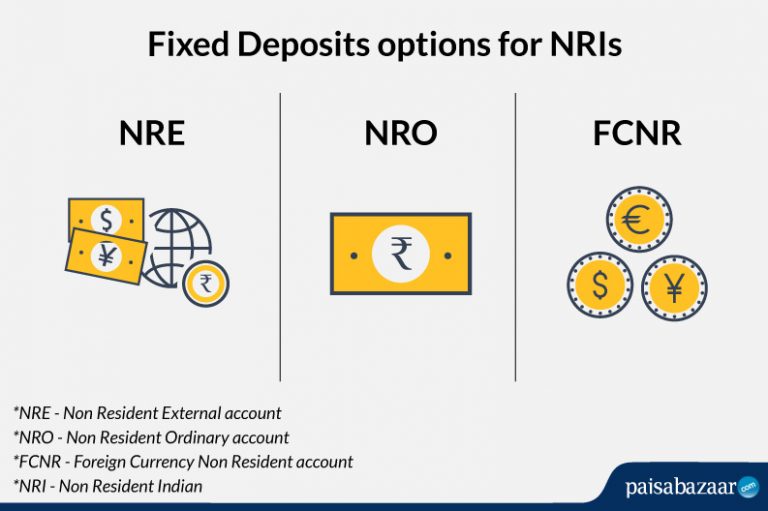
Here we shall make a comparison as NRE vs NRO vs FCNR to understand how these three accounts differ from each other and what purpose they solve for Indians living in foreign lands.
NRE vs. NRO vs. FCNR
| Particulars/Type Account | NRE | NRO | FCNR |
| Deposit Currency | Foreign currency | Indian Rupee (INR) | Foreign Currency |
| Withdrawal Currency | Indian Rupee | Indian Rupee | Foreign Currency |
| Taxable in India | Not taxable in India | Taxable in India (at 30%) | Not Taxable in India |
| Exchange Rate Risk | Open to risk due to fluctuating foreign exchange rate | No foreign exchange risk involved | No foreign exchange risk involved |
| Repatriability (Transferability) | Fully and freely repatriable | Interest is repatriable; transfer of principal amount comes with certain set limits | Fully and freely repatriable |
Now let’s talk about these types of NRI fixed deposit accounts in detail:

Book SBM Bank FD & Get Lifetime FREE Step UP Credit Card Know More
What is the NRE FD account
NRE is the abbreviation of Non-Resident External Account. NRE accounts can be maintained as savings/current accounts or as fixed deposit accounts.
Purpose: To help NRIs invest their foreign income in Indian financial institutions and avail withdrawal in INR to manage expenses or other financial concerns in India.
Features of an NRE fixed deposit A/c
- The deposit can be made in foreign currency in an NRE FD account (which is converted into INR at the prevailing exchange rates)
- Once the deposit is made, it starts earning interest as per the applicable FD rates for the respective tenure
- Withdrawals are made in Indian National Rupee (INR)
- The entire fund value (deposit amount + interest earned) is credited to the account of the depositor in Rupees
- Interest earned is not taxable in India
NRE is also known as a Non-Resident Extraordinary Account.
Suggested Read: Best NRE FD Rates in 2022
What is an NRO FD account
NRO is the abbreviated term for a Non-Resident Ordinary account.
Purpose: To help NRIs invest and manage their Indian income in Indian financial institutions.
Features of an NRO fixed deposit A/c
- NRO fixed deposit account can be opened by NRIs to invest their savings in Rupee
- This type of account specifically provides NRIs with the option to invest their Indian earnings in Indian currency
- Withdrawals are made in INR only
- It is taxable in India

Get Secured Credit Card with credit limit of 100% of your FD Apply Now
What is the FCNR FD account
FCNR is an acronym for Foreign Currency Non-Resident account.
Purpose: To help NRIs manage their foreign earnings in Indian Banks and NBFCs.
Features of an FCNR fixed deposit A/c
- Deposits in this type of fixed account can be made in foreign currency
- Withdrawals are also done in foreign currency, thus there is no conversion loss involved
- The interest earned on the FCNR fixed deposit account is not taxable in India
Suggested Read: FCNR Deposits – Pros and Cons
What is an RFC account
RFC or Resident Foreign Currency account is designed to help residents of India manage their foreign income.
Purpose: To help R-NOR individuals maintain their foreign earning in India without having to bear the forex risks.
Features of an RFC fixed deposit A/c
- Deposits in this account are made in foreign currency
- This account is especially useful for Returning Indians who have savings in foreign currency and want to bring the same back to India
- Not taxable in India till the depositor maintains the R-NOR (Resident but Not Ordinary) status

Get Lifetime FREE Step UP Credit Card With No Annual Fees Know More
NRE, NRO or FCNR: Which is better
All these three accounts are different from each other in ways more than one. The only common factor here is that these accounts are made to benefit Non-Resident Indians.
Where the NRE account is good for those who wish to invest their foreign income in India and use it to manage expenses in India, FCNR is better suited for those NRIs who wish to manage their expenses and investment-related issues outside India.
As far as the NRO fixed deposit account is concerned, this is suitable for those who have Indian income. They can invest this money in an NRO account.
Thus, we cannot say that any of the said deposit types score over the other. Each type of NRI FD account serves a different purpose. Thus it depends on the depositor’s requirement as to which type of NRI fixed deposit account shall be best suited for them.
Suggested Read: Income Tax on Bank FDs

